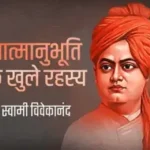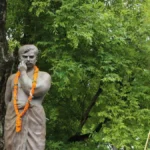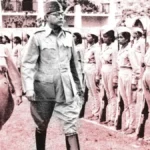Swami Vivekananda, a name synonymous with spiritual wisdom, youth empowerment, and cultural revival, continues to inspire millions even a century after his passing. His autobiography, “Vivekananda Ki Aatmkatha,” presents a unique insight into his life, thoughts, and struggles. Coupled with National Youth Day, celebrated annually on 12th January, commemorating his birth anniversary, this blog explores his life’s journey and how his teachings remain relevant to modern youth.
Swami Vivekananda’s Early Life: The Birth of a Visionary
Born as Narendranath Datta on 12th January 1863 in Kolkata, Vivekananda’s childhood was marked by curiosity, intellect, and a keen interest in spirituality. His mother’s influence played a crucial role in shaping his moral character and philosophical outlook. The young Narendra displayed extraordinary memory, a questioning spirit, and an intense desire to understand the deeper meaning of life.
Meeting with Ramakrishna Paramahamsa
Narendra’s life took a significant turn when he met Ramakrishna Paramahamsa at Dakshineswar. Under Ramakrishna’s guidance, he discovered the essence of Vedantic philosophy and the universality of religion. This meeting laid the foundation for his future mission – spreading the message of oneness, compassion, and self-realization
A Monk’s Journey Across India
After the death of his guru, Vivekananda embraced the life of a wandering monk. He traveled extensively across India, witnessing the dire conditions of the masses. These experiences convinced him of the urgent need for national regeneration through education, spiritual awareness, and social reform. His travels also deepened his understanding of India’s rich cultural and spiritual heritage, which later became the cornerstone of his message to the world.
World Parliament of Religions: A Moment of Glory
In 1893, Vivekananda represented India at the World Parliament of Religions in Chicago. His famous speech began with the words, “Sisters and Brothers of America,” which won over the audience with its warmth and depth. He emphasized religious tolerance, universal brotherhood, and the core philosophy of Vedanta. This event catapulted him to international fame and marked the beginning of his mission in the West.
Establishment of Ramakrishna Mission
On returning to India, Vivekananda founded the Ramakrishna Mission in 1897. The mission focused on social service, education, and spiritual development, guided by the principles of selfless service and devotion. Today, the Ramakrishna Mission continues to be a beacon of hope, providing education, healthcare, and disaster relief across the world.
Teachings of Swami Vivekananda: A Guide for Modern Youth
Swami Vivekananda believed that youth held the key to a nation’s future. His teachings emphasize strength, character-building, and self-confidence. He famously said:
“Arise, awake, and stop not till the goal is reached.”
Some of his key teachings for the youth include:
1. Believe in Yourself: Self-belief is the foundation of success.
2. Education for Character: True education goes beyond academics; it builds character and strengthens moral values.
3. Service to Humanity: Serving others is the highest form of worship.
4. Spiritual Awakening: Spirituality is essential for personal growth and inner peace.
National Youth Day: Honoring Vivekananda’s Legacy
In 1984, the Government of India declared 12th January as National Youth Day to honor Swami Vivekananda’s contributions. Since then, the day is celebrated with events, seminars, and cultural programs in schools and colleges across the country. The objective is to inspire young minds to follow Vivekananda’s ideals and work towards personal and societal development
Significance of National Youth Day
Encourages Youth Empowerment: By spreading Vivekananda’s message, National Youth Day motivates young individuals to take charge of their lives and contribute positively to society.
Promotes Cultural Awareness: The day helps in reviving interest in India’s cultural and spiritual heritage.
Fosters National Unity: Vivekananda’s call for unity and brotherhood resonates with the day’s objective of fostering harmony among India’s diverse communities.
Relevance of Vivekananda’s Message Today
In a world marked by rapid technological advancement and societal challenges, Vivekananda’s teachings offer timeless wisdom. His emphasis on self-reliance, critical thinking, and moral integrity is crucial in addressing contemporary issues such as:
1. Mental Health: Vivekananda’s stress on mental strength and meditation can help youth cope with stress and anxiety.
2. Leadership: His call for fearless action and ethical leadership is essential for building a just and equitable society.
3. Global Citizenship: Vivekananda’s vision of universal brotherhood encourages global cooperation and peace.
Conclusion
“Vivekananda Ki Aatmkatha” is more than just an autobiography; it’s a guide to living a purposeful life. As we celebrate National Youth Day, let us draw inspiration from Swami Vivekananda’s life and teachings. By embodying his ideals, today’s youth can lead India towards a brighter future, fulfilling his dream of a spiritually awakened and prosperous nation.
Let us all remember his words:
“Take up one idea. Make that one idea your life – think of it, dream of it, live on that idea. Let the brain, muscles, nerves, every part of your body, be full of that idea, and just leave every other idea alone. This is the way to success.”
Swami Vivekananda’s legacy lives on, inspiring generations to rise above mediocrity, pursue greatness, and serve humanity selflessly.
Related posts:
 Unlocking the Secrets of Self-Realization: Insights from Swami Vivekananda’s ‘Atmanubhuti Ke Khule Rahasya
Unlocking the Secrets of Self-Realization: Insights from Swami Vivekananda’s ‘Atmanubhuti Ke Khule Rahasya
 Gyanyog: The Spiritual Legacy of Swami Vivekananda
Gyanyog: The Spiritual Legacy of Swami Vivekananda
 The Relevance of Mahavir Swami’s Philosophy in Today’s World
The Relevance of Mahavir Swami’s Philosophy in Today’s World
 The Role of Chandra Shekhar Azad in Indian Independence
The Role of Chandra Shekhar Azad in Indian Independence
 Netaji Subhas Chandra Bose: The Journey of a Committed Revolutionary Nationalist
Netaji Subhas Chandra Bose: The Journey of a Committed Revolutionary Nationalist
 Why Dr. Ambedkar’s Ideas Matter in 2025
Why Dr. Ambedkar’s Ideas Matter in 2025
